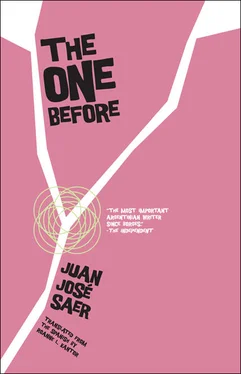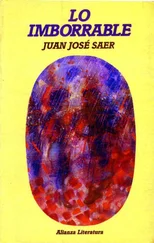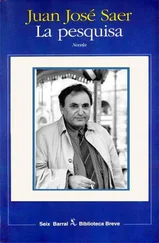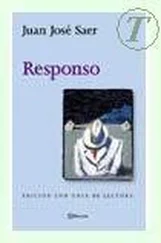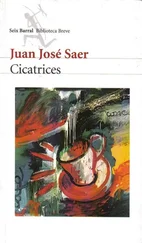One rainy morning in November I slept in until after it was light. The murmur of the water was audible, both complex and monotonous — that’s been said so many times of water! Greenish light came into the room through the blinds. I lay in bed with my eyes open, staring at the semidarkness that was growing ever weaker, but that gathered against the ceiling. The dream I’d just had remained in my mind, persistent, a dream in which I had seen my uncle Pedro, my mother’s brother, who worked for a long time in the factory and then afterward struck out on his own and opened a bakery. My uncle had died the month before. In the dream he seemed to be mourning his own death.
Dreams scare me, and sleep even more so. Am I afraid of what I dream or am I simply afraid of dreaming? I was sad that morning, thinking about my uncle Pedro who ended up dying just as his bakery was starting to do all right, but then, fortunately, curiosity overcame my sadness and I began to meditate on the meaning of the dream until almost nine. All this time it rained without stopping, and the noise of the rain lulled me almost to sleep, so that now I’m not sure whether at times I didn’t dream up the meaning of what I had dreamed. A female friend of mine, a school teacher who later married a professor of mathematics and moved to Peru, told me that she had always dreamed of mourning over her own coffin. That she saw herself dead and mourned. Do we always mourn for ourselves when we mourn in dreams? Only the mourner knows that. Looking into this fount of tears is a difficult task, and curiosity’s quiet gaze cannot see so deep. To see that pain, we have to be inside it. But what is even more surprising is that he who mourns himself, the one who sees his cadaver or offers condolences to himself over his own death, stands at such a singular point in the great plain of pain that his cry is at the same time a memory and an anticipation. In the great plains the horizon is always a circle, identical, empty and monotonous.
The sun in April doesn’t sink, it slims. We go out walking after dinner, avoiding the cold shade and stopping every once in a while to look at a yellowing frond, the ornamentation on a façade. We argue over sex and politics. For me, they are siestas full of statues and delicate sun; after several blocks, my temples begin to throb. We pass through the Plaza de las Palomas, head to the promenade, lean over the rail, and look at the river. As I see it, it is at that hour that cities flatten and stretch out. It has seemed to me, at times, that I know everything about statues, about the urine that disfigures and stains them, about the old houses that bear witness to more perfect lives.
Even finer, the dusty sunlight — at a certain hour — is smooth and omnipresent. We sit on a wooden bench, on powdered brick paths, to warm our heads. Suddenly we are silent. What we call the murmur, the soft sound of years of life, the sound of what we remember, is passing by, bit by bit, until it falls utterly silent. Then we begin to hear sounds outside: a car, far off, the shouts of two boys calling to one another beyond the park and the rotunda of the promenade, even the clicks of women’s heels as they tap against the powdered brick. I know of nothing more real. Within my heart — could you call it that? — the empty echo of those whispers resounds. I’ve surprised myself in those moments, asking with a sudden dread “Who am I and what am I doing here?”
Afterward, when we are walking again and we go into the first bar, the feeling disappears, I have worked out a theory that the April sun flowing slowly downward onto the city is unhealthy, and that its effects are like those of marijuana, but more diffuse.
Angel Leto, an old friend of Barco and Tomatis’s whom they hadn’t heard from in years, was alone in a house waiting for the appointed moment to kill a man. It was a winter morning, green and rainy, and Leto, who had just gotten up, came from the kitchen through the semidarkness of the hallway into the light of the living room, carrying with him a cup of coffee. If he followed through with the plan, by the next day at half past eight in the morning the man would already be dead and Leto would be back in the house where Tomatis’s books were carefully lined up on the bookshelf, gathering dust while their owner spent the summer in Europe.
It was, in fact, Tomatis’s apartment, to which Barco had given him the keys two days earlier. Barco had found Leto in his kitchen, on another rainy morning, and had given him the keys, neither put out nor surprised even though it had been nearly eight years since the last time he had seen him. And, as Leto thought that very night, in bed, as he flipped through Tomatis’s originals with pleasure and credulity, smoking a cigarette by lamplight against the monotonous background of the June rain that enveloped the night like a cocoon, if Barco didn’t yet know exactly what he was up to in the city, within two or three days, if he read the papers, he would be sure to figure it out.
And now Leto, in his second morning at Tomatis’s place, walked to the living room from the kitchen, through the dark hall, with the white cup on the white saucer balanced on the palm of his hand. He sat down, placing the cup carefully on the table, and set about reading one of Tomatis’s manuscripts held in a green folder upon which Tomatis had printed, in red ink, a word Leto didn’t know: PARANATELLON. On the first page inside the folder there were three words printed all in capital letters, one after the other, separated by several spaces, in the following order:
PARANATELLON
PARANATELLERS
OR
PARNASUS
And farther down an inscription in lowercase:
An annotated anthology of the coast
A bit later, when the last sip of coffee at the bottom of the cup had gone cold, Leto lifted his eyes from the typed pages, and, leaning the nape of his neck on the backrest of the chair and contemplating the ceiling, he began to think of the man he was going to kill. The man who had been the object of his every action these past several months could not hold his attention for long, because his thoughts soon wandered to considering death in general. His first thought was that, for all that he might riddle this man’s body with bullets, as he fully intended to do, he would never manage to completely rid the world of him. The man deserved to die: he was a union leader who had betrayed his class and whom Leto’s group held responsible for several assassinations. But, thought Leto, as if his ideas emanated from the grayish emptiness that extended between the lamp and the ceiling, killing him would only take him out of immediate action, not out of reality.
And Leto remembered when he was eighteen and a friend of his age had died after an operation. Now that he was thirty-three, it seemed that, after fifteen years, time had lost its fearsome character and his dead friend remained as present in the world as he himself, independent from his memories and authority. What comes into the world, Leto thought, can never go out again. The infinitude of stars would remain, whether they liked it or not, wandering around with us inside them. And, like a bird that eats its own eggs, time went on erasing events as they unfolded, leaving nothing to human life but its indeterminate presence, a kind of clot of solidarity that kept reducing and encrusting itself in some imprecise point in the infinite, and from which every individual, as a just consequence of his mortal condition, formed a part. This clot, thought Leto, was of a singular quality: it could never be erased. Its presence had produced an irreversible alteration, redeeming the universe from pure ostentation; after its appearance, nothing would continue as before, and death — the death of his friend, the death of the man he was going to kill, his own death — was an insignificant accident.
Читать дальше
